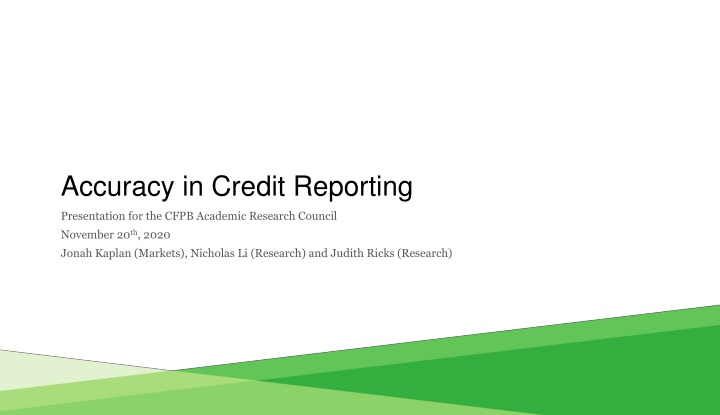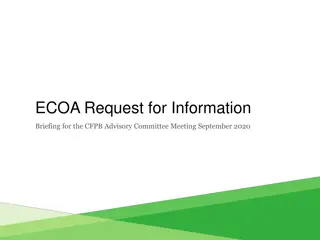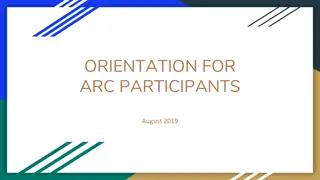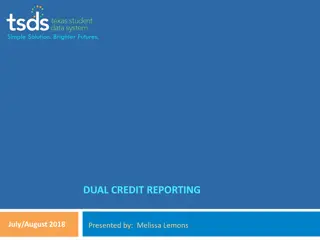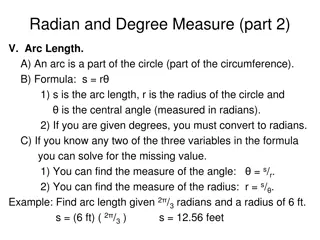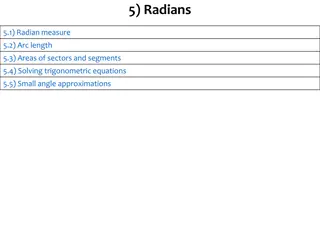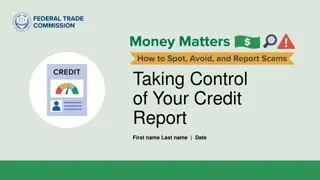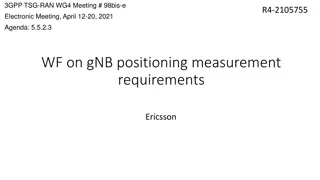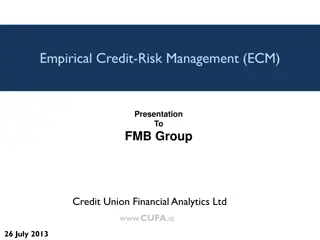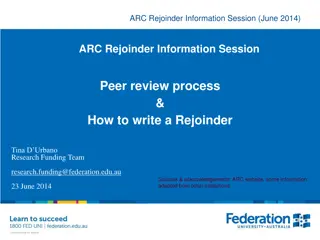Evolution of Credit Reporting and Consumer Awareness
Credit access is crucial for consumers, yet inaccurate credit reporting can have significant impacts on credit scores. Studies show that errors in credit reports are common, with many consumers disputing inaccurate information. The regulatory landscape has evolved since the 2012 FTC study, with increased focus on accuracy and consumer education. Recent developments include regulatory settlements, greater awareness of credit issues, and data breaches prompting changes in the credit reporting industry.
Download Presentation

Please find below an Image/Link to download the presentation.
The content on the website is provided AS IS for your information and personal use only. It may not be sold, licensed, or shared on other websites without obtaining consent from the author.If you encounter any issues during the download, it is possible that the publisher has removed the file from their server.
You are allowed to download the files provided on this website for personal or commercial use, subject to the condition that they are used lawfully. All files are the property of their respective owners.
The content on the website is provided AS IS for your information and personal use only. It may not be sold, licensed, or shared on other websites without obtaining consent from the author.
E N D
Presentation Transcript
Accuracy in Credit Reporting Presentation for the CFPB Academic Research Council November 20th, 2020 Jonah Kaplan (Markets), Nicholas Li (Research) and Judith Ricks (Research)
Credit access plays a vital role in the lives of consumers. Many consumers have varying types of credit (e.g., mortgages, auto loans) and often have multiple of the same account types (e.g., credit cards, student loans) The status of any account can be reported in an individual s credit report. This credit reporting is directly tied to credit scoring algorithms and a consumer s access to credit. 2
Potential effects of inaccurate credit reporting Inaccurate credit reporting can affect a consumer s credit score. Effect could be positive or negative Example: Reporting error due to a current account being misreported as delinquent. Similar consumers can have arbitrarily different credit scores. Example: Institutional differences in the approach to furnishing information. Consumers have to make a choice between Spending resources (e.g., time and money) to correct inaccurate information OR Bearing the cost of the inaccuracies 3
The 2012 FTC Study Assessed accuracy in credit reporting and the dispute process, where consumers can request that reported information be reviewed and potentially corrected. Consumers were invited to review credit reports for errors. When errors were found, consumers were asked to dispute the errors. Findings: 26% of participants disputed an error in at least one NCRA file 5% had substantial errors that decreased their credit tier 70% believed that their data remained inaccurate even after dispute These findings are qualitatively similar to a different study by PERC (2011). 4
A lot has changed since the 2012 FTC study There has been an increased regulatory focus on accuracy. CFPB s Supervisory program Multi-state/Nationwide Credit Reporting Agency (NCRA) settlement There has been substantial growth in consumer awareness of credit reporting and scoring issues. No fee score access programs available through financial institutions and lead generation firms (e.g., Credit Karma) Data breaches (e.g., Equifax breach in September 2017) 5
A lot has changed since the 2012 FTC study (continued) There also has been an increased interest among policy experts to understand credit reporting and accuracy. Natural Disasters and Credit Reporting (CFPB, 2018) Payment Amount Furnishing and Credit Reporting (CFPB, 2020) 6
Considerations for new analysis Use of the Bureau s Consumer Credit Panel (CCP) The CCP is a 1-in-48 sample of consumer credit reports with tradeline-level information. The CCP can be used to analyze aggregate trends in credit reporting (furnishing) and disputes over time. A refresh of the 2012 FTC study Given the growing awareness surrounding credit reporting, a similar analysis may offer very different results than the earlier study. A new study would also allow for modifications to the FTC study, including the experimental design and outcomes of interest. 7
Considerations for new analysis (continued) Other possibilities A consumer survey on experiences related to credit reporting and accuracy, potentially based off of a sample from the Bureau s CCP. Testing of the dispute process undergone by NCRAs through, e.g., dispute simulations. Randomly sample furnished data to assess accuracy and correctness. 8
Discussion What should be the Bureau s top-of-mind research priorities with respect to credit reporting accuracy? What are the policy-relevant areas? What do you see as the key outcomes of interest for a new study? If the Bureau were to conduct an original analysis on credit reporting accuracy, should the focus be on a one-time study or recurring analysis? An example of a one-time study could include a lab study similar to the 2012 FTC analysis. An example of recurring analysis could include regular surveys to consumers. 9
Discussion (continued) If the Bureau were to conduct an original analysis on credit reporting accuracy, should new analysis focus on consumer experiences, NCRA processes, or institutional furnishing? If the Bureau were to conduct a refresh of the 2012 FTC study What do you see as the primary challenges? How would you improve on the earlier study? 10
